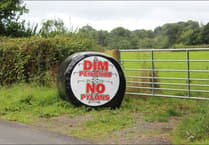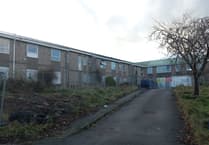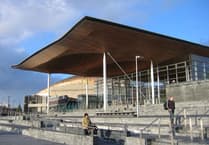I recently returned from the Netherlands where I visited the Commonwealth War Cemetery in Oosterbeek. The soldiers interred there died during Operation Market Garden. Most people will know about the battle that took place there from the film A Bridge Too Far. The staff who look after the graves sent me some acorns from the trees surrounding the cemetery, which are now seedlings in pots in my garden. I’m trying to complete a job started by one of my uncles. Oosterbeek is such a peaceful town, it’s hard to imagine the horrors that took place there.
In the West, most of us have never experienced war first-hand. I was an idealist and, like many people, rejoiced when the Berlin Wall came down, thinking that world peace was achievable really soon. How wrong we were.
Aberaeron Memorial Hall is having a series of events this year as the hall celebrates its centenary. I went along to listen to the Band of the Welsh Guards. They are fantastic musicians but, as the Band Leader told me, they are soldiers first. I don’t think there was a dry eye in the hall when they played Karl Jenkins’s Benedictus from The Armed Man. That piece of music reminded us all that the Memorial Hall was built to commemorate those we’ve lost in wars.
My mother told me lots of horror stories of the German occupation. Like the children and grandchildren of the soldiers buried in Oosterbeek, I don’t want to forget the terrible sacrifice these soldiers and their families made, and want my grandchildren to know and understand. VE Day is an important reminder that war is possible here. The UK’s involvement in defending Ukraine is sad but necessary.
Walking past the rows of white gravestones in Oosterbeek, we were silent. Here lie buried young men, mostly from the UK, many from the Borders Regiment, who died in their late teens and early twenties, sacrificing their lives in the Allied attempts to defeat fascism. We met some young Polish men. There are many Poles buried and we helped the men find the Polish graves. We hugged and cried together, words weren’t needed.
But tears and handwringing are not enough. Watching the innocent suffer in Sudan and Gaza, we can feel utterly powerless. We look at the UN for hope but that body appears impotent to stop the megalomaniacs of this world.
War is not just repulsive for the victims directly in the path of weapons and vengeful soldiers, it’s also a major contributor to climate change. David Boyd, UN special rapporteur for human rights says, “Armed conflict pushes humanity even closer to the precipice of climate catastrophe.” Military emissions don’t have to be reported to the UN but a recent study calculated “that militaries account for almost 5.5 percent of global greenhouse gas emissions annually — more than the aviation and shipping industries combined.” Climate change is likely to lead to further conflicts. We could find ourselves in a vicious circle of pure misery.
Yet, there’s a lot we can all still do to help defeat those powers in the world who wish to control, be it resources or people. We simply must act to stop wars. We can write, campaign, protest, sign petitions. We can use our buying power to boycott certain countries. We can donate to aid organisations. And we have to support democracy, not be cynical and stay at home at elections, proclaiming ‘they’re all the same.’ If you don’t like the candidates, join a political party, stand yourself, but don’t be apathetic. We live in a free country with free speech; let’s use it.




Comments
This article has no comments yet. Be the first to leave a comment.